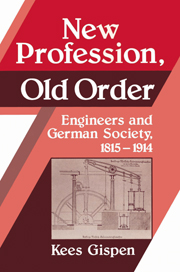Crossref Citations
This Book has been
cited by the following publications. This list is generated based on data provided by Crossref.
MEIKSINS, PETER
and
SMITH, CHRIS
1993.
Organizing Engineering Work.
Work and Occupations,
Vol. 20,
Issue. 2,
p.
123.
Zachmann, Karin
1997.
Women to replace the ‘front officers of technology'? On the development of technical studies for women in the soviet occupation zone and the GDR (1946–1971).
History and Technology,
Vol. 14,
Issue. 1-2,
p.
97.
Murmann, Johann Peter
2003.
Knowledge and Competitive Advantage.
Downey, Gary Lee
Lucena, Juan C.
and
Mitcham, Carl
2007.
Engineering Ethics and Identity: Emerging Initiatives in Comparative Perspective.
Science and Engineering Ethics,
Vol. 13,
Issue. 4,
p.
463.
Khelfaoui, Hocine
2008.
L’enseignement professionnel en Algérie : contraintes institutionnelles et réponses sociales.
Sociologie et sociétés,
Vol. 40,
Issue. 1,
p.
143.
Murphy, Mike
and
Coyle, Eugene
2012.
Engineering, Development and Philosophy.
Vol. 11,
Issue. ,
p.
341.
Muskat, Birgit
Muskat, Matthias
and
Blackman, Deborah
2013.
Understanding the cultural antecedents of quality management in tourism.
Managing Service Quality: An International Journal,
Vol. 23,
Issue. 2,
p.
131.
Crawley, Edward F.
Malmqvist, Johan
Östlund, Sören
Brodeur, Doris R.
and
Edström, Kristina
2014.
Rethinking Engineering Education.
p.
231.
Downey, Gary Lee
Lucena, Juan
and
Mitcham, Carl
2015.
Engineering Identities, Epistemologies and Values.
Vol. 21,
Issue. ,
p.
81.
Kaltenbrunner, Wolfgang
2018.
Situated Knowledge Production, International Impact: Changing Publishing Practices in a German Engineering Department.
Minerva,
Vol. 56,
Issue. 3,
p.
283.
Nygaard, Pål
2020.
Engineering way lost: Norwegian engineers’ reactions to challenges from Americanization and industrial democracy.
Management & Organizational History,
Vol. 15,
Issue. 3,
p.
199.
Schmitt, Miriam
2021.
Women Engineers on Their Way to Leadership: The Role of Social Support Within Engineering Work Cultures.
Engineering Studies,
Vol. 13,
Issue. 1,
p.
30.
Ding, Jeffrey
2024.
The Rise and Fall of Technological Leadership: General-Purpose Technology Diffusion and Economic Power Transitions.
International Studies Quarterly,
Vol. 68,
Issue. 2,





